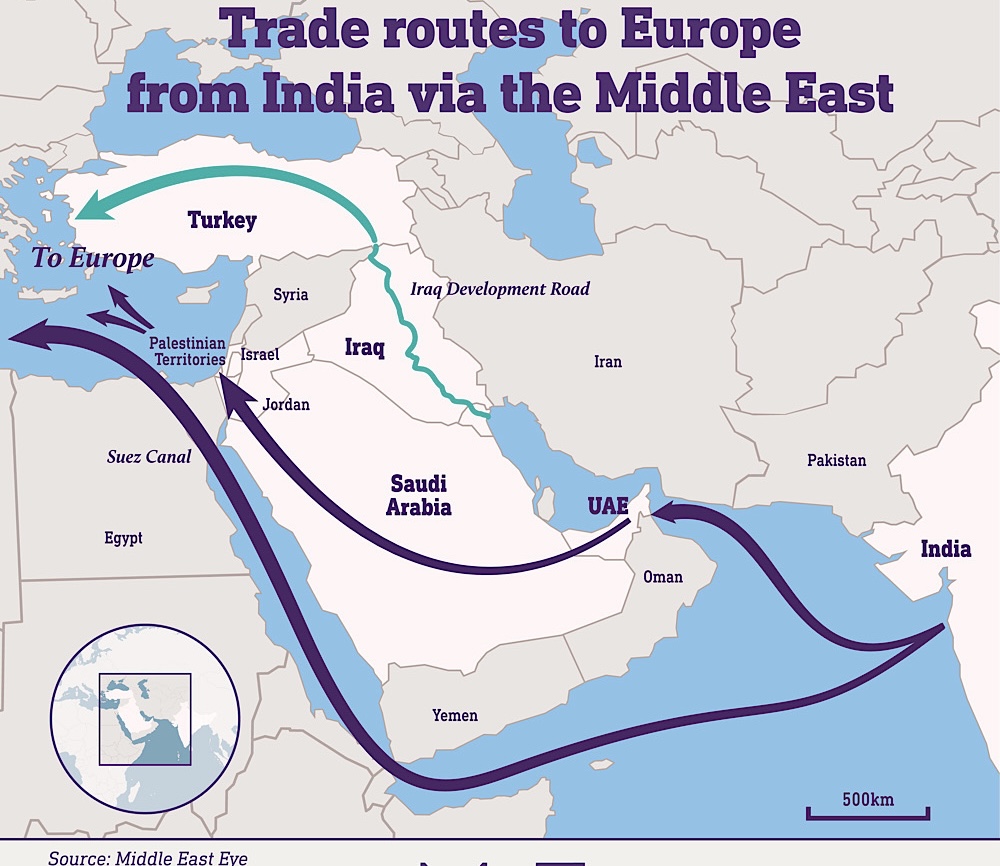Ankara to target Kurds to protect alternative trade route to Suez
Turkey is developing a US$ 17 billion, 100,000-job project to connect Asia and Europe by rail and road, competing with rival Israel and the United Arab Emirates. This is why Turkey’s military is planning a summer campaign against the PKK in Iraqi Kurdistan. A high-level meeting between Turkish and Iraqi officials was held today in Baghdad.
Istanbul (AsiaNews) – War and economy. Military operations and trade routes. In the Middle East, weapons and money go increasingly hand in hand, as evinced by a major offensive Turkey is preparing for this summer in the west of Iraqi Kurdistan against the Kurdistan Workers' Party (PKK).
Turkey considers the latter a terrorist group, and wants to drive it south to secure a new trade route from the Persian Gulf to transport goods to the Mediterranean.
Dubbed Development Road, the new highway would link Asia to Europe, going from Basra to the Turkish border, worth US$ 17 billion, countering the hegemony of the Suez Canal, which is in a crisis, following Houthi attacks in the Red Sea.
According to sources cited by Middle East Eye (MME), the planned military operations will target the western areas of the semi-autonomous region of Iraqi Kurdistan, targeting areas next to the territory controlled by the Kurdistan Democratic Party (KDP), an ally of Ankara, cutting off the PKK's access to Mosul.
"Turkey's main purpose is very clear. The presence of the PKK in Metina and Gara has the potential to seriously threaten the Iraq Development Road Project,” a Turkish source said, referring to the planned 1,200km highway and railway project that would connect the Gulf to Turkey through Iraq.
For both Ankara and Baghdad, the goal is “to remove PKK from these two areas as well as secure the area for the construction of the project, reaching both objectives in one step.”
Iraq, Turkey, and the Gulf Arab states hope to soon finalise the project, which involves transporting goods through the port of al-Faw in Basra governorate to international markets via Turkey.
Baghdad expects trains to operate at speeds of up to 300 km per hour, making it easier to transport passengers and freight.
In addition, plans include the creation of logistics hubs, industrial complexes, and the potential integration of oil and gas pipelines.
This ambitious project is estimated to require an investment of about billion, with an expected annual return of US$ 4 billion and the creation of at least 100,000 jobs.
President Recep Tayyip Erdogan is among the main supporters of the project, which he is promoting in direct competition with the rival India-Middle East-Europe Economic Corridor (IMEC) supported by Israel and the United Arab Emirates, which bypasses Turkey.
Earlier this week, Turkish Defence Minister Yasar Guler said Ankara wants to deploy forces 30-40 km deep into Iraqi territory, setting up a joint operations centre with Baghdad, although the project seems to be stalled.
According to Turkish sources, the Iraqi army has begun to build up its forces on the demarcation line between the Turkish army and the PKK, deploying troops in the Balinda area, an administrative transition between Duhok and Mergasor in the KDP-controlled area.
It is not yet clear whether Baghdad has moved its forces to the region to cooperate with Turkey or to act as a buffer between the PKK and Erdogan's army to avert further clashes.
For some time, the Kurds in Syria and Iraq have been caught between Iran and Turkey, with missiles and drones causing casualties and serious damage to infrastructure in areas already subject to heavy bombing and military attacks in the past.
Tehran has concentrated its operations in Iraqi Kurdistan, where it believes Kurdish resistance bases and opposition figures are concentrated. Its crackdown intensified after the death of a 22-year-old Kurdish woman, Mahsa Amini, in September 2022.
At the same time, Ankara has accelerated cross-border operations, considering the Kurdish-Syrian area to be the area of origin of the PKK (and YPG) cell that struck on 13 November 2022 in Istanbul, killing six people and wounding dozens.
Such operations end up involving not only the PKK but civilians as well, in particular the residents of Christian villages in the mountainous area of Iraqi Kurdistan on the border with Turkey, Syria and Iran.
Iraqi and Turkish officials were set to meet in Baghdad today to discuss energy cooperation, security, and defence.
The meeting could also be an opportunity to discuss joint operations with KRG forces to secure the area from Mosul to Duhok and the Turkish border town of Ovakoy, also as part of the Iraq Development Road project.
This large-scale infrastructure project is vital for Turkey in the so-called Middle Corridor, a trade route that stretches from Asia to Europe.
However, the struggle between Baghdad and Erbil over the sale of oil through the Iraqi-Turkish pipeline, on which the Iraqi Supreme Court itself has ruled, causing havoc to the finances of the Kurdistan region, is complicating matters.
(Photo: Middle East Eye)
28/09/2023 16:23
12/02/2022 17:33







.png)










